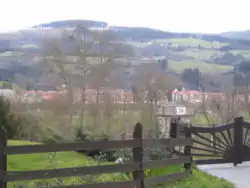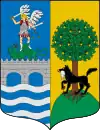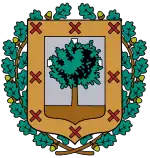Zalla
Zalla is a town and municipality located in the province of Biscay, in the Autonomous Community of the Basque Country, northern Spain, 24 kilometers to the southwest of Bilbao. The river Cadagua runs through the city. According to the 2019 census, it has 8,447 inhabitants.
Zalla | |
|---|---|
 Zalla as seen from Ibarra | |
 Flag  Coat of arms | |
 Zalla Location of Zalla within the Basque Country | |
| Coordinates: 43°12′51″N 3°07′52″W | |
| Country | Spain |
| Autonomous community | Basque Country |
| Province | Biscay |
| Comarca | Enkarterri |
| Founded | 12th century |
| Government | |
| • Mayor | Juanra Urkijo Etxeguren[1] (PNV) |
| Area | |
| • Total | 31.03 km2 (11.98 sq mi) |
| Elevation | 96 m (315 ft) |
| Population (2018)[2] | |
| • Total | 8,379 |
| • Density | 270/km2 (700/sq mi) |
| Demonym(s) | Spanish: zallense |
| Time zone | UTC+1 (CET) |
| • Summer (DST) | UTC+2 (CEST) |
| Postal code | 48860 48850 48869 |
| Website | Official website |
Popular culture
The Zallense people are known for their popular culture and especially for their mythology. In Zalla, superstitions and beliefs in evil supernatural beings, sorcerers and witchcraft were widespread.
The hermitage of San Pedro Zariquete was a pilgrimage center against the evil eye and against demons. Thousands of devotees who believed themselves possessed by evil spirits in search of the corresponding exorcism passed through the year. The rite was to go to the chapel on the day of the saint on a path (while throwing handfuls of salt), and return on the other, so that the evil spirits did not re-enter the disemboweled person.[3]
Notable people
- José de Urrutia y de las Casas: military, cartographer and engineer (s.XVIII).
References
- "Corporación municipal". Zalla Ayuntamiento Udala (in Spanish). Retrieved 3 July 2019.
- Municipal Register of Spain 2018. National Statistics Institute.
- "La Ermita de San Pedro de Zariquete en Zalla, Bizkaia:Un enclave de origen Medieval en Las Encartaciones" (PDF). Gurutze Arregui, estudios etnográficos existentes en esta ermita y relacionados con los conjuros. ARREGUI AZPEITIA, G. "Ermitas de Bizkaia", T. III, PP. 437. G. "Ermitas de Bizkaia", T. III, P. 437. KOBIE (Serie Paleoantropología), Bilbao Bizkaiko Foru Aldundia-Diputación Foral de Bizkaia N.º XXII, 1995. Retrieved 7 March 2020.
